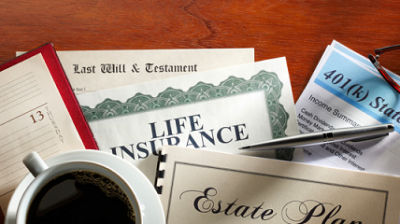Estate planning is an often-neglected subject in financial planning. The reasons I’ve heard from people about why this is the case run the gamut from not believing they have enough assets to warrant having an estate plan to thinking it’s a morbid subject, since you are talking about plans for your own death!
However much people may want to avoid thinking about the latter, estate planning is an essential piece of securing your personal finances. In fact, nearly everyone has elements of an estate plan in their lives, even if they don’t realize it: if you own a retirement account (and most workers today have a 401(K), an IRA or both) and have named a beneficiary for that account, congratulations – you have a piece of an estate plan!
Make sure your estate plan doesn’t stop there. Below is an excerpt from an article on the CFP Board’s blog, Let’s Make a Plan. The checklist of estate planning actions they have created is a great place to start tackling this subject. Remember, a well thought out estate plan is essential to ensure that your assets and heirs are properly protected. Do your loved ones a favor and take care of it today.
———————————————–
By Lynn Ballou
A comprehensive estate plan tailored just to you and your needs, your legacy and your heirs will provide peace of mind and security knowing there is a plan in place for when you’re no longer with them. By following this checklist, you’ll be on your way to building an effective estate plan:
Start with a will. A will is a document that provides instructions at your death for how you wish your assets to be distributed. It can also name your executor, guardians for minor children (if appropriate) and provisions for your pets. It is the critical starting point of your estate plan, no matter how simple or complex.
Find out if you also need one or more trusts. The most common trust, a revocable, or “living trust,” is designed to avoid the probate process and expense. Without a trust, your will may go through probate in the courts, which can often be time-consuming and expensive. A living trust can also be helpful if you are incapacitated, by providing guidance to those who will be filling your shoes when you cannot function in your normal life roles.
Create powers of attorney. Although it sounds ominous, these powers are extremely helpful by allowing those you wish to “be you” if you cannot and handle everything from your daily financial matters to your health-related decisions. Without these written powers, the court may need to be involved in selecting others to act on your behalf. And since we live in an increasingly complex time with constantly evolving medical choices, be sure to leave detailed guidance using a health care directive.
Update your beneficiaries for your retirement assets and life insurance policies. The most well-written estate plan documents are useless unless you title assets correctly and name your beneficiaries per the terms of your estate plan. Your documents alone are not enough. Work with your CERTIFIED FINANCIAL PLANNER™ professional and estate planning attorney to implement all the appropriate changes in account and asset titling, and naming beneficiaries. Use the forms provided by each custodian, understanding that if your estate plan is somewhat complicated, you may need to provide additional specific language.
Incorporate lifetime gifting into your plans. For many, the ability to create a legacy of gifting both within and outside their family matters deeply. During your lifetime you can employ a variety of gifting strategies that might help you reduce your estate and your current income tax bite. Even without those benefits, lifetime gifting can be immensely personally satisfying. Because many of us don’t have enough wealth to gift fully during our life, especially if we are uncertain as to how much of an asset base we’ll really need to use ourselves, your estate plan is your chance to name heirs and charities as beneficiaries of what remains.
Who should have copies of my estate planning documents? Of course, your attorney and your trusted CFP® professional, who act in a fiduciary capacity on your behalf, should have a complete and current copy. You may also wish to give copies of certain documents, such as the powers of attorney, to those who will need them in the event of your incapacity or death. It’s also important to communicate to your named executor(s) and alternates the names of your financial advisor and your estate planning attorney as well as their contact information and the location of your documents (e.g., your safe, your bank deposit box).
Things change – now what? Your kids grow up, their needs and capabilities become clearer, grandchildren are born, a loved one passes away, your net worth changes, your medical needs evolve – any and all of these, along with many others, are reasons to meet with your advisors and consider an update to your estate plan. Don’t forget that Congress is continually tinkering with estate tax law, so you should be aware of issues that might affect you and your plan, as well as potential revisions that might be sparked by those changes.
Crafting and maintaining a comprehensive estate plan will provide you and your loved ones with a sense of ease, knowing they are covered when you’re gone. For more information and guidance on mapping out an estate plan, seek help from a CFP® professional in your area.
